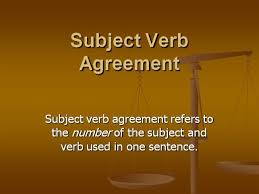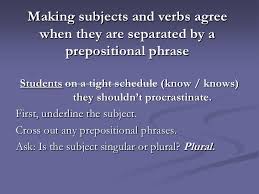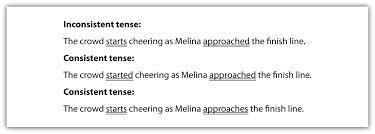Overview
Verbs carry the action in sentences. Sometimes, however, it is difficult to choose the correct form of the verb to use when number, order, and tense are in question. Some strategies for correcting verb forms include editing phrases temporarily, rewriting questions, checking indefinite pronouns, and noting verb tenses.
Cross out Prepositional Phrases
Prepositions are parts of speech such as of, about, before, behind, after, above, with, between, on, and under that show locations in time and space. They do not contain the subject of a sentence, but may modify the subject. When they come between the subject and verb, they can cause confusion about which form of the verb to use, singular or plural.
Singular Subjects and Singular Verbs
The lawn mower cuts the grass. The subject mower and the verb cuts are next to each other, making it easier for the writer to decide on the correct form. Any modifiers are before the subject-verb combination. More often, the subject and verb aren’t that close together. Suppose the sentence were “The computer beside the books shows the blue screen of death.” Is the subject the singular computer or the plural books? If the subject is singular, the verb should be singular also, but if it is plural, then the verb should be plural. By crossing out the prepositional phrase beside the books, the singular computer is the subject and takes a singular verb.
Plural Subjects and Plural Verbs
Similarly, when the subject is plural, the verb should be plural, and the technique of crossing out prepositional phrases between the subject and verb also works for plurals. Suppose the sentence were, “The three dogs behind the fence bark incessantly.” The prepositional phrase behind the fence separates the plural subject dogs from the plural verb bark.
Rewrite Sentences
Sometimes the sentence separating the subject and the verb is in the form of a question, reversing the usual order. Suppose the sentence were “Have the students registered for all their classes?” It can be recast as a statement, showing the students (pl.) have (pl.) registered for all their classes. Also, sentences beginning with here and there automatically reverse the order of the subject and the verb, and can be temporarily moved. The sentence “Here is the box you wanted” can be rewritten as “The box you wanted is here.”
Indefinite Pronouns
Indefinite pronouns such as each, either, neither, one, none, anybody, anyone, anything, somebody, someone, something, everybody, everyone, and everything are singular, because they single each member out of a group. They take singular verbs in formal usage, such as formal essays. One way to check whether the verb is the correct form when editing a paper is circle the indefinite pronoun, then check the verb form to see if they agree.
Verb Tense
It is easier than it looks to shift verb tenses unintentionally. Today I write, yesterday I wrote, and tomorrow I shall write and know the difference in tense. After I finish this post, I listened to a new CD. The shift in verb tense adds confusion, and needs recasting before the Temporal Police arrest the writer. It should read, “After I finish this post, I will listen to a new CD,” which is a shift in the same direction, present to future.
Interested in English tutoring services? Learn more about how we are assisting thousands of students each academic year.
SchoolTutoring Academy is the premier educational services company for K-12 and college students. We offer tutoring programs for students in K-12, AP classes, and college. To learn more about how we help parents and students in Middletown, DE: visit: Tutoring in Middletown, DE





